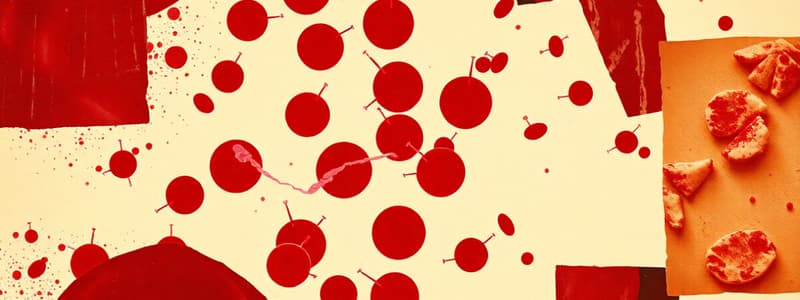Podcast
Questions and Answers
What is the purpose of performing a differential leucocyte count?
What is the purpose of performing a differential leucocyte count?
To identify the different types of white blood cells and their percentages in the blood.
What two types of stains are included in Field's stain?
What two types of stains are included in Field's stain?
Eosin and Methylene blue.
Describe the first step in the preparation of a blood film.
Describe the first step in the preparation of a blood film.
Make a skin puncture on the left middle finger to obtain a small drop of blood.
What is the optimal angle for the spreader when preparing a blood film?
What is the optimal angle for the spreader when preparing a blood film?
How long should the blood film be left in Leishman stain?
How long should the blood film be left in Leishman stain?
What is the purpose of diluting the stain with distilled water after initial staining?
What is the purpose of diluting the stain with distilled water after initial staining?
What are the characteristics of a well-prepared blood film?
What are the characteristics of a well-prepared blood film?
What is used to dry the blood film after preparation?
What is used to dry the blood film after preparation?
What characteristics are used to identify white blood cells?
What characteristics are used to identify white blood cells?
What is a noticeable feature of neutrophils compared to other white blood cells?
What is a noticeable feature of neutrophils compared to other white blood cells?
How does cedar wood oil enhance the examination of blood films?
How does cedar wood oil enhance the examination of blood films?
What distinguishes eosinophils from other white blood cells?
What distinguishes eosinophils from other white blood cells?
What type of granules do basophils have and how do they appear under staining?
What type of granules do basophils have and how do they appear under staining?
Identify the two classifications of white blood cells.
Identify the two classifications of white blood cells.
Describe the nucleus shape of monocytes.
Describe the nucleus shape of monocytes.
What is the significance of the 100 small squares drawn on paper in counting white blood cells?
What is the significance of the 100 small squares drawn on paper in counting white blood cells?
Study Notes
Differential Leucocyte Count (DLC)
-
Purpose of DLC: To identify the different types of white blood cells (WBCs) and determine their percentage in the blood. This helps understand the clinical significance of any abnormalities in WBC count.
-
Requirements: Microscope, glass slides (including a spreader), Leishman stain or Field's stain, distilled water, cedar wood oil, lancet, and alcohol swab.
-
Composition of Field's Stain:
- Alcohol (Methanol): Fixes the blood sample to the slide.
- Eosin (Acidic dye): Stains basic particles (basic granules) of WBCs.
- Methylene blue (Basic dye): Stains acidic particles (nucleus and acidic granules) of WBCs.
Steps for DLC
-
1. Preparation of Blood Film:
- Aseptic precautions are followed to obtain a small blood sample from a finger prick.
- A drop of blood is placed on a clean, grease-free slide.
- A spreader slide is held at a 45-degree angle and moved across the blood drop, creating a thin, even blood smear.
- The smear should be neither too thick nor too thin, free of ridges or holes, and cover approximately 3/4th of the slide.
- The slide is dried by waving it in the air.
-
2. Staining of Blood Film:
- The dried smear is dipped into Leishman stain for 2-3 minutes, allowing the stain to cover the entire smear.
- After 2-3 minutes, the stain is diluted with distilled water for 6-8 minutes.
- The smear is dried in the air.
-
3. Examination of Blood Film:
- A good smear appears light purple, rectangular with a dense head end and a tapering tail end.
- A drop of cedar wood oil is placed on the slide, and the microscope objective is switched to oil immersion (100x).
- Cedar wood oil has a refractive index similar to glass, reducing light diffraction and increasing clarity.
-
4. Identification of White Blood Cells:
- Cell identification is based on:
- Size of the cell
- Shape of the nucleus and number of lobes
- Staining of the nucleus (intensity and uniformity)
- Presence, size, number, and staining reaction of granules
- Cell identification is based on:
-
Types of White Blood Cells:
-
Granulocytes: Possess granules in their cytoplasm.
- Neutrophils: Diameter 10-14 microns, 2-5 lobed nucleus, fine violet-colored granules.
- Eosinophils: Diameter 10-14 microns, bilobed nucleus, coarse pink granules.
- Basophils: Diameter 8-10 microns, bilobed nucleus, coarse blue granules.
-
Agranulocytes: Lack granules in their cytoplasm.
- Lymphocytes: Diameter 7-14 microns, round or slightly bean-shaped nucleus, clear cytoplasm lacking granules.
- Monocytes: Diameter 16-22 microns, largest WBCs, kidney or horseshoe-shaped nucleus pushed to one side, clear cytoplasm lacking granules.
-
-
5. Counting of White Blood Cells:
- A grid of 100 small squares is used to systematically count the different types of WBCs in a specific area of the blood smear.
Studying That Suits You
Use AI to generate personalized quizzes and flashcards to suit your learning preferences.
Related Documents
Description
This quiz focuses on the Differential Leucocyte Count (DLC), a vital tool for understanding white blood cell composition and its clinical significance. It covers the purposes, requirements, and steps involved in preparing and analyzing a blood smear using Field's stain. Test your knowledge on this important laboratory technique and its applications!




